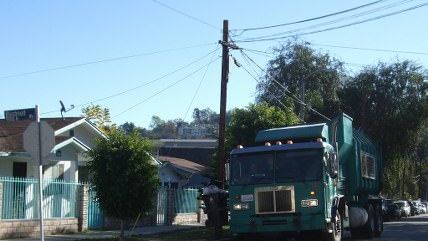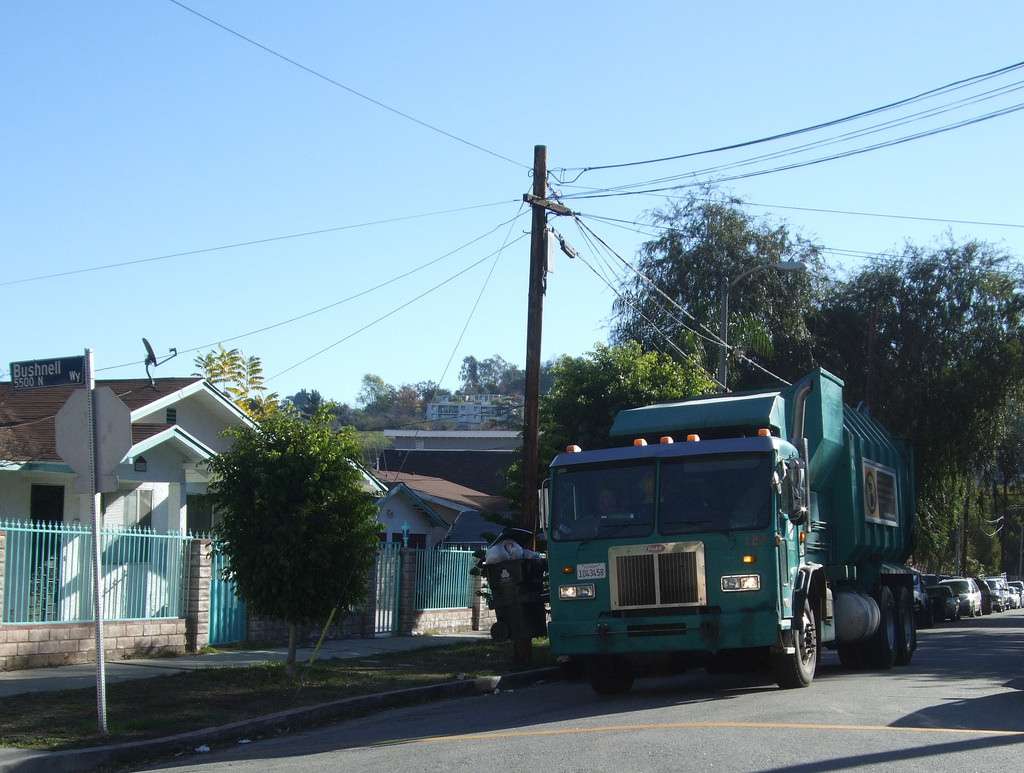How L.A. Plans to Trash Dozens of Local Businesses
The city is glossing over crony capitalism and union patronage with nods to environmentalism.


Los Angeles hopes to divert 90 percent of its trash from landfills by 2025 as part of its "Zero Waste" program. According to one study commissioned by the city, L.A. achieved 76 percent diversion in 2012.
The latest step the city claims will get Los Angeles closer to this goal is a franchise system for trash haulers who serve apartment complexes and local businesses. Currently, residential customers who are in single-family homes or duplexes are served by the city's Department of Sanitation. Commercial properties and apartment complexes are served by private trash haulers.
Under the new plan, approved by the Los Angeles City Council in April, private haulers will continue to serve these customers, but they'll have to bid for franchise licenses and pay the city to do so. These franchise licenses will be exclusive. Private trash haulers will no longer compete for customers. Instead the city will be split into 11 districts, and each district will be served by a single company. No trash company may earn more than 49 percent of the accounts under the new system.
What does turning private trash haulers into the equivalent of exclusive city subcontractors have to do with the environment anyway? The Bureau of Sanitation's 153-page manual provided to companies looking to bid for these franchises describes some of the recycling aims. Companies are required to have trash trucks that are certified as low-emission vehicles and are less than eight years old. The companies are expected to continue any recycling and organic waste diversion from commercial establishments (restaurants, for example) who are already receiving this service and they're expected to expand the city's diversion efforts to help the city reach its "zero waste" goal.
Responding to questions sent via e-mail, Los Angeles Bureau of Sanitation Director Enrique Zaldivar explained, "Franchise holders will have to use efficient routing and clean fuel vehicles which will decrease emissions as well as damage to city roads. They will have to provide clean vehicles and bins, removing graffiti and keeping them in good repair. Customer service will be tracked and haulers will be responsible for providing excellent and responsive service, including a customer service office in each zone, online service requests and bill payment, and the use of apps and other media to upgrade customer communications."
Still don't understand why the city needs to turn to exclusive district-based monopolies to achieve this goal? You're not the only one. Ron Saldana, executive director of the Los Angeles County Disposal Association, said his group had been lobbying for non-exclusive franchises, which is how Los Angeles County operates for commercial properties (though it does have exclusive franchise agreements for residential customers).
"It was working very, very well," Saldana said. "What it does is preserve a competitive marketplace. You have to meet certain requirements. If you qualify, you can apply for a franchise. The only difference is the exclusivity and there is no competition."
These exclusive agreements will last for 10 years, with options for two five-year extensions. The competition will be to get the contracts; after that, there's no more marketplace. Given that there are only 11 districts, dozens of existing L.A. trash companies will be rendered unable to legally haul commercial and apartment-complex waste. Saldana predicts that this system could shut down about 40 businesses for good.
The environmental argument in support of exclusive franchises is that they will reduce the total number of garbage trucks on the road, prevent overlapping routes, and reduce air pollution further. Proponents claim the changes will eliminate tons of greenhouse gas emissions. Saldana calculates, however, that 80 percent of current commercial and multi-family trash hauling is done by four or five businesses. Presumably these big players will be fighting over the contracts, while the smaller companies who never contributed nearly as much pollution may be shut out entirely.
Zaldivar's response to concerns that these franchises will push out small haulers is to point out that most of these businesses depend on the construction and demolition industries for jobs, and this type of work is not going to be affected by the shift to franchises. He added, "There are a number of small- to medium-sized local hauling companies that intend to propose on the small franchise areas, or are soliciting the ability to be a subcontractor for the proposers, which we encourage."
But while the city and supporters are praising the new trash plan's environmental components, huge swathes of its regulations have absolutely nothing to do with recycling or waste diversion. By turning these waste haulers into city contractors, Los Angeles is able to push onto them all sorts of additional labor union-favored rules.
As city contractors, trash companies will be required to comply with the city's living wage ordinance and pay its employees at least $11.03 per hour if they also have health benefits, $12.28 if they do not. Under the city's First Source Hiring Ordinance, trash companies will be required to inform the city's Development Department Workforce Development System of any job openings, interview any applicants referred to them by the city, and explain their reasons if they decline to hire any of them.
Potential trash franchises also have to have prove that they've signed a "labor peace agreement." These are agreements in which the union agrees not to picket or arrange any work stoppages at a company in exchange for certain concessions, such as the business accepting card checks for unionization votes rather than secret balloting or agreeing to maintain a position of neutrality during efforts to organize.
The requirement for a labor peace agreement doesn't tell trash companies what they have to concede, nor does it give them any authority to require a union to approve an agreement. But they must have a labor peace agreement in order to be awarded a contract. Thus, these rules essentially give unions veto power over anybody looking to land a franchise. No wonder labor union members were celebrating outside City Hall when the council approved this new system.
These agreements are notable in areas where labor unions have significant power, particularly in Los Angeles. The Los Angeles Board of Airport Commissioners approved similar demands of airline and airline service providers at Los Angeles International Airport in May, with the endorsement of Los Angeles Mayor Eric Garcetti.
The U.S. Chamber of Commerce analyzed labor peace agreements in 2013 and concluded that while their proponents claim they balance the interests of two sides (the unions give up the right to call strikes), in actuality they force businesses to concede to union organizers what they wouldn't normally concede in exchange for being able to actually work within a municipality. They note about San Francisco's labor peace ordinance:
San Francisco's labor peace ordinance rewards the potential threat of harmful behavior by forcing the employer to make concessions and surrender its rights established by federal law. While the union also gives up rights, such as the right to picket, boycott, or strike, such rights are of little consequence in exchange for significant organizing concessions. This is especially true in San Francisco, as the union only gives up those rights during the initial organizing campaign—it is free to strike, picket, and boycott once collective bargaining has commenced.
When asked about the inclusion of the labor peace demand, Zaldivar emphasized the idea that this protects consumers from strikes but didnt address the coercive nature of the requirement. "Labor peace agreements protect the City of Los Angeles from labor based disruptions during the term of the franchise contracts," he said. "Proposers are not required to have union employees. The agreement is between the proposer or its subcontractors performing collection services, and any labor union that expresses a desire or seeks to represent its employees."
Beyond the union language, the city also details a complex web of customer service regulations and safety standards trash franchisees must follow. It has two-and-a-half pages devoted to the many fines contractors will pay for everything from failing to clean the trucks at least once per week to failing to respond to a missed pickup on the same business day.
Saldana said he's still examining the document and attempting to absorb all the details. Trash haulers have until October to submit their proposals. Even though the agreements appear to favor large haulers, Saldana said the massive scope of what the city is attempting to do makes it a challenge for businesses to try to calculate bids.
"There are high recycling goals that have to be met," he said. "It will cost a lot of money if they don't meet recycling goals. Maybe I'm diverting 60 percent. What will it cost me to get to 75 percent? … There's a lot of analysis and a lot of hard decisions. Do I have to build new facilities and build new technologies? Not an easy analysis for any company."
But it's a boon for unions looking to use the power of municipal government to increase their rolls. If this experiment takes off, trash haulers (and their customers) in other municipalities should worry whether they'll be allowed to continue functioning as entirely private businesses.


Show Comments (8)